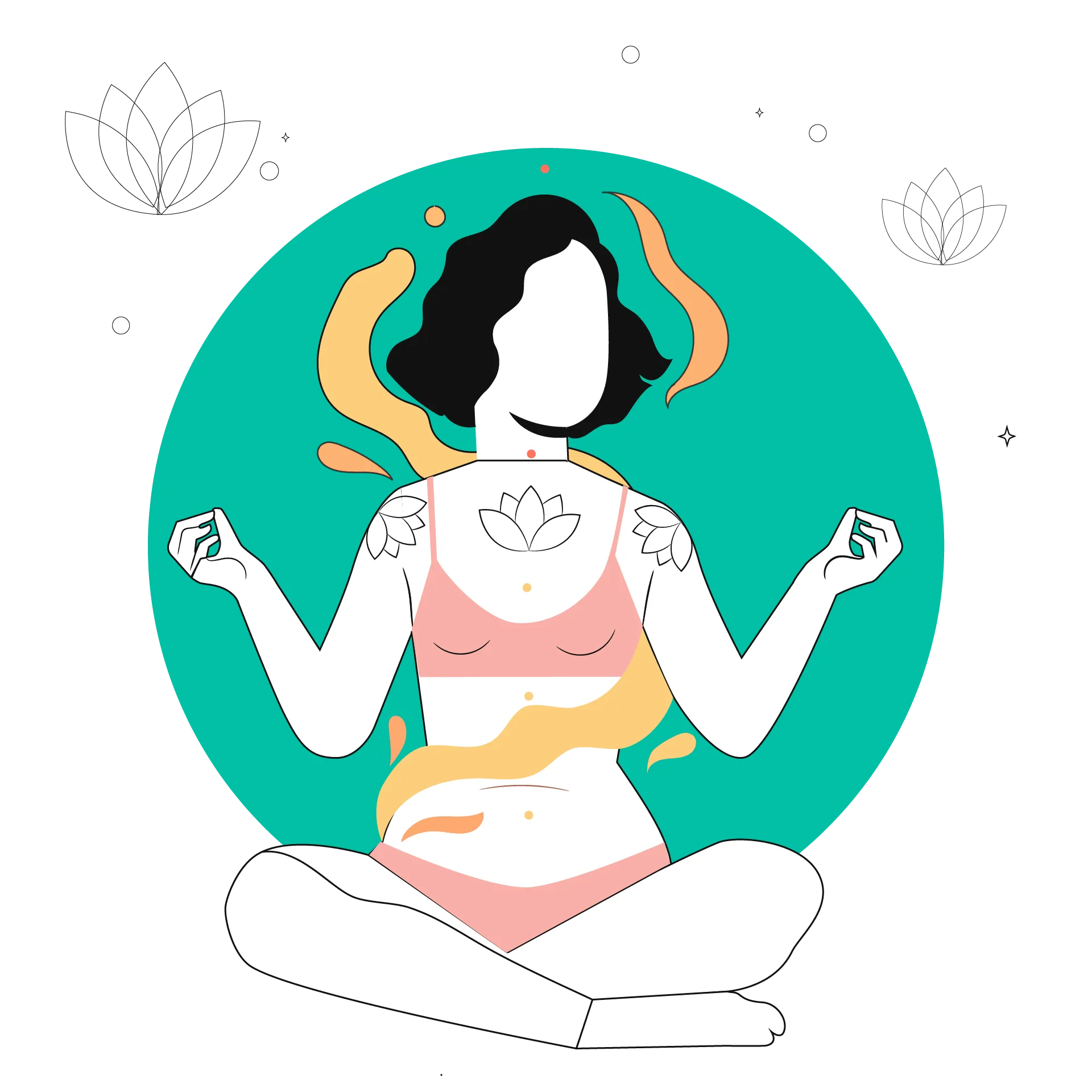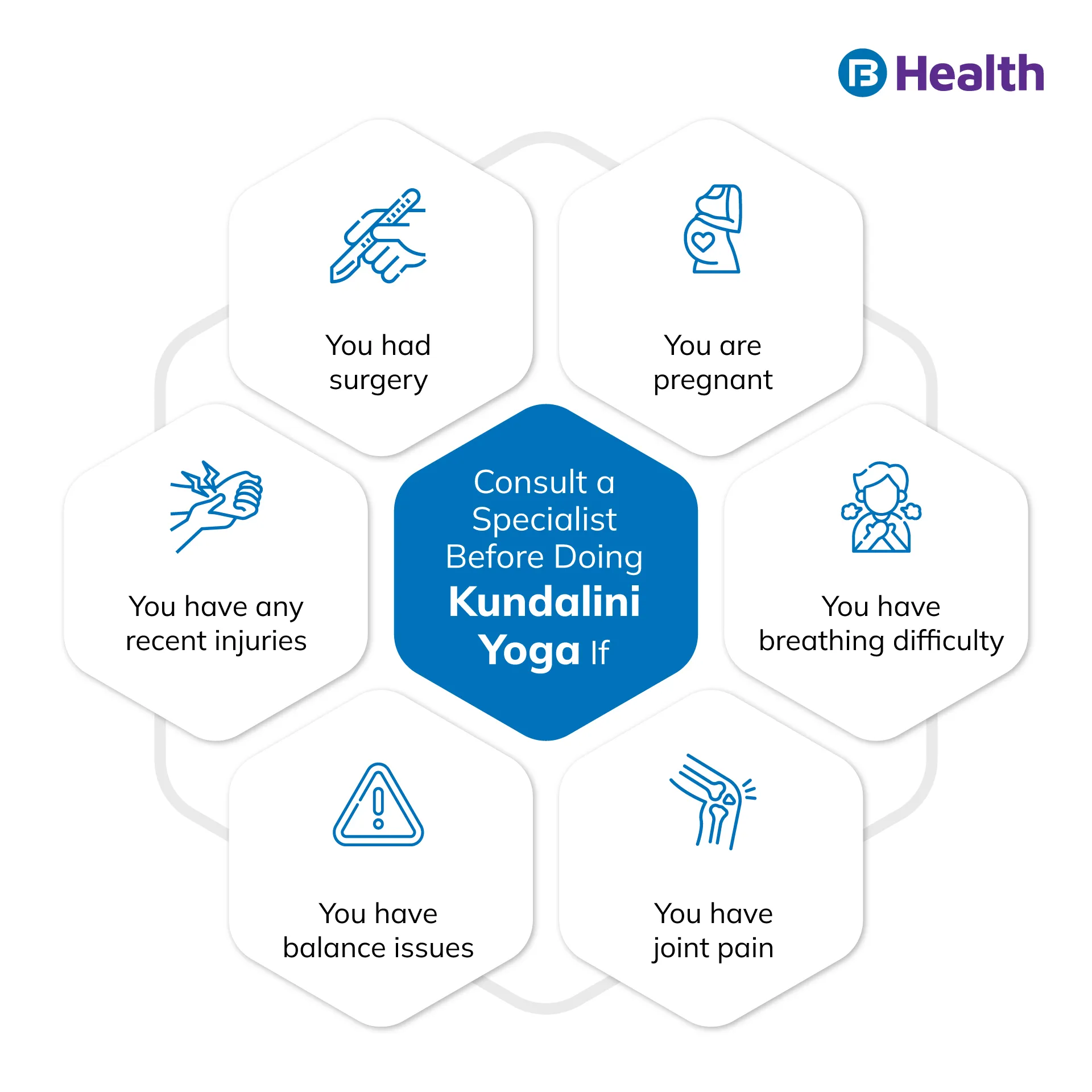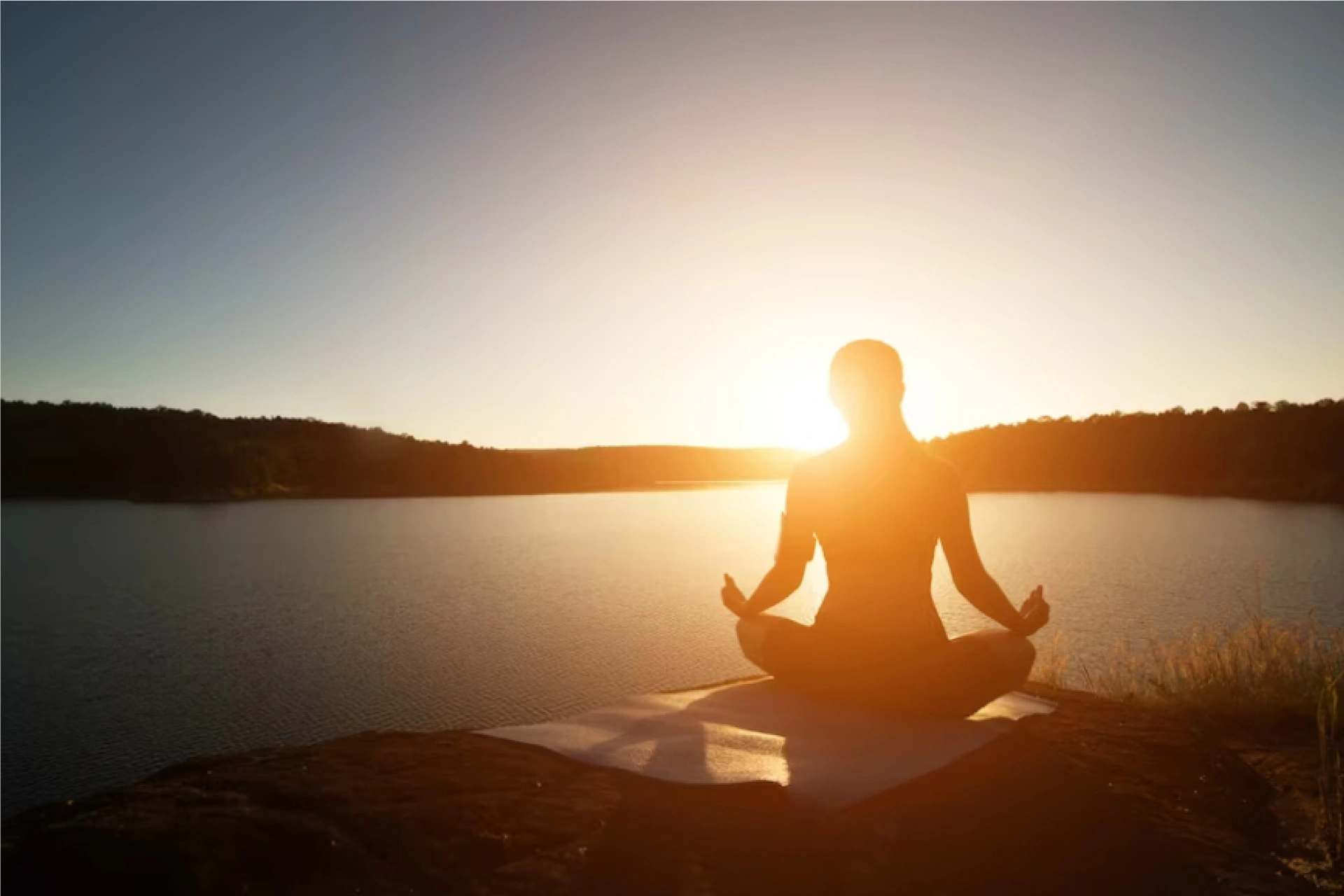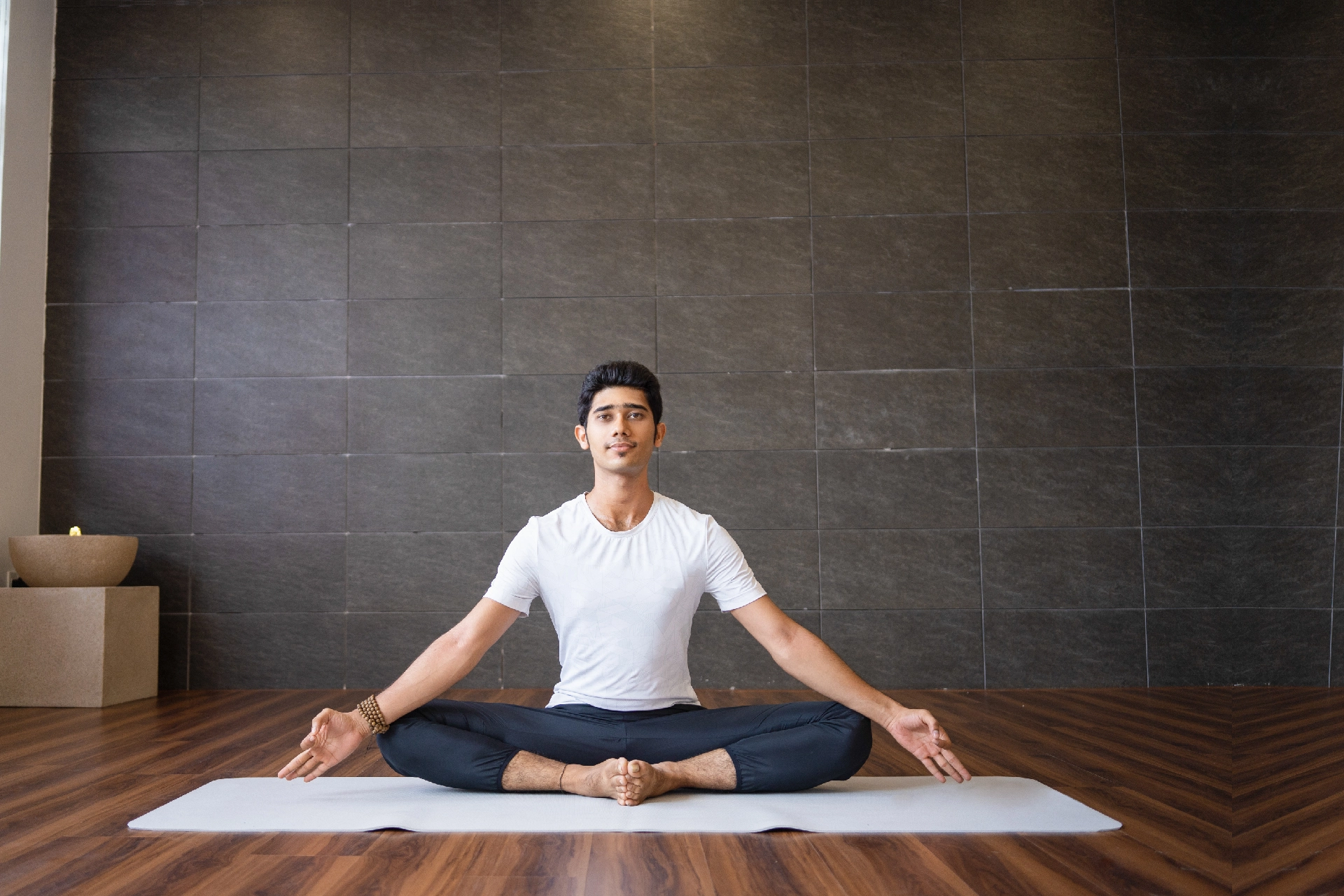Physiotherapist | 6 min read
Kundalini Yoga: Yoga Poses, Health Benefits and Precautions
Medically reviewed by
Table of Content
Key Takeaways
- Kundalini yoga poses helps quiet your mind and make you more self-aware
- Improved mood and reduced stress are common benefits of kundalini yoga
- To make the most of yoga exercises consistent practice plays a vital role
Kundalini is the unused energy located at the bottom of your spine [1]. With the help of kundalini yoga, you can free this untapped energy by opening up seven chakras. As a result of the free flow of this energy throughout your body, you can feel refreshed and rejuvenated.
This style of yoga benefits both old and young practitioners. Kundalini yoga poses are a combination of movements, meditation, breathing, and chanting. The goal of kundalini yoga is to make the body stronger and more energetic while increasing your level of consciousness and self-awareness. Read on to learn some of the yoga poses you can try and their benefits.
Benefits of Kundalini Yoga
Relief From Anxiety And Stress
- Kundalini yoga, like other types of yoga, can aid in reducing tension and anxiety.
- Participants in a short 2017 study reported feeling immediately less stressed after doing Kundalini yoga. After three additional months of practice, this impact persisted.
- Similar findings were found in a 2018 study that found participants' anxiety levels decreased after eight weeks of Kundalini yoga practice. According to the study's findings, Kundalini yoga may be a useful treatment for those suffering from a generalized anxiety disorder.
Enhances Cognitive Performance
- Eighty-one people with mild cognitive impairment were investigated in a controlled experiment in 2017. Two groups of individuals were created at random. For 12 weeks, one group performed Kundalini yoga while the other received memory-enhancing training.
- At the conclusion of the trial, both groups had a considerable increase in their memory, but only the Kundalini group demonstrated both short- and long-term gains in executive functioning. This comprises, among other things, cognitive flexibility, thinking, and problem-solving abilities.
- The Kundalini yoga group had cognitive enhancements and a decrease in depressive symptoms.

Increases Self-perception
- Kundalini yoga may enhance body positivity and self-acceptance, according to a small 2017 study. Nine women with bulimia nervosa and anorexia nervosa reported experiencing these advantages.
- The researchers found that Kundalini yoga may improve eating disorders by enhancing one's perception of and appreciation for oneself.
Spiritual Enlightenment
- According to popular belief, as your Kundalini energy rises, you develop stronger spiritual ties to both yourself and other people.
- Anecdotal evidence rather than scientific proof has been used to justify these advantages.
- The following are some of the claimed advantages:
- More compassion
- Expanded imagination
- Improved charisma
- Greater energy
- Peace within
Some additional benefits Kundalini yoga offers for both mental and physical health are:
- Improvement in cognition and your mood [2]
- Healthier levels of blood sugar
- Reduced stress and anxiety [3, 4]
- Increased flexibility [5]

Kundalini Yoga Poses
Here are some simple poses of kundalini yoga for beginners.
Sufi Grind Pose
One of the seated yoga poses, this pose focuses on your spine and helps balance your root chakra. It also aids in digestion. You can perform this pose by following these steps:
- Sit cross-legged on a mat and relax your body
- Put your hands on your knees and rotate your spine in a circle while sitting for at least 60 seconds
- Keep your head upright and take deep breaths
- Inhale as you circle forward across your knees. Exhale when you rotate back to the starting position
- Keep your eyes closed and meditate while performing this pose
- After 60 seconds, move in the opposite direction. If you were rotating clockwise, do it anti-clockwise.
Archer Pose
This is one of the kundalini yoga poses that help creates stability in the body. It also helps make you feel confident, like a warrior. To perform this pose, follow these simple steps:
- Stand straight, with your feet touching each other side by side
- Rotate your right foot about 45 degrees outward. Step back while straightening your leg
- Make sure to bend your left knee in a way where it doesn't go past your left foot
- Extend your arms to your shoulder height
- Make sure to curl both your hands into fists, pointing your thumbs upwards
- Rotate your upper body towards the left side while bending your right elbow
- Bring your right fist inwards toward your armpit
- Look straight ahead and take deep breaths
- Hold this position for 1 to 2 minutes
- Then try the opposite side with your left leg on the back side and the left arm bent
Lotus Pose
Lotus pose is one of the basic seated yoga poses which helps open your hips. It can be a little difficult for you to do this pose if you have tightness in your hip area. Try it slowly to avoid bad posture. You can perform the lotus pose by following these easy steps:
- Sit down on a mat with your legs extended forward.
- Bend your knees outward and bring your feet towards your body. The position should resemble as if you were about to sit in a cross-legged position.
- Place your right foot on your left thigh and your left foot on top of your right thigh.
- Take deep breaths. Hold this position for as long as it feels comfortable, and then switch legs.
Frog Pose
Also known as Mandukasana, this kundalini yoga pose helps open up the flow of energy in your body. Here are the steps to perform the frog pose:
- Kneel down on the floor while keeping your knees as wide apart as possible. Make sure you do not strain your knees or your hips.
- Flex your feet strong enough to let the inner edges of your feet touch the ground. The angle in the ankles and knees should not be more than 90 degrees.
- Once you get comfortable in this position, lower down toward your forearms.
- Look down and stretch your neck. Relax your heart and stomach. This will help you draw your shoulder blades inwards towards one another.
- Push your hips downward and back. Remain in this pose for a few minutes and take deep breaths
Precautions For Kundalini Yoga Steps
Yoga requires patience. Thus, the process must be honored. Keep a few things in mind as you practice Kundalini yoga. Like all forms of yoga, kundalini should be practiced safely. Be cautious if you:
- Have breathing issues
- Have joint pains
- Have an injury
- Having a problem with balance
- If you are menstruating or pregnant
This is not a conclusive list of kundalini yoga poses as there are various other yoga exercises you can try at home. Practice and consistency will help you enjoy the benefits of performing kundalini yoga. If you face any difficulties or have any health concerns, talk to a doctor. To get a doctor's consultation, you can book an appointment on Bajaj Finserv Health. The healthcare professionals on the platform can help create a yoga routine specific to your body. With their expert guidance, you can also practice yoga for eyes, weight-loss, and more, and benefit your overall health.
References
- https://psycnet.apa.org/record/2016-44946-004,
- https://pubmed.ncbi.nlm.nih.gov/28088925/
- https://pubmed.ncbi.nlm.nih.gov/29369073/
- https://pubmed.ncbi.nlm.nih.gov/28546677/
- http://indianyoga.org/wp-content/uploads/2017/04/v6-issue2-article3.pdf
Disclaimer
Please note that this article is solely meant for informational purposes and Bajaj Finserv Health Limited (“BFHL”) does not shoulder any responsibility of the views/advice/information expressed/given by the writer/reviewer/originator. This article should not be considered as a substitute for any medical advice, diagnosis or treatment. Always consult with your trusted physician/qualified healthcare professional to evaluate your medical condition. The above article has been reviewed by a qualified doctor and BFHL is not responsible for any damages for any information or services provided by any third party.




